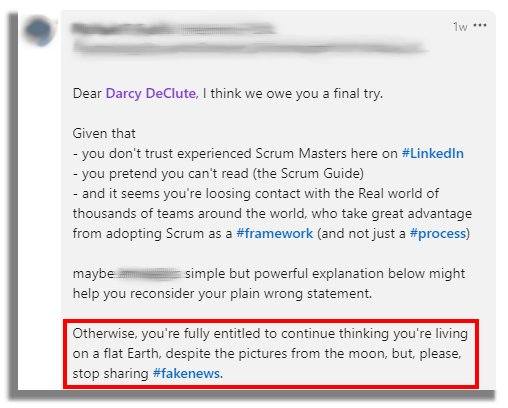Scrum is not a framework
Is Scrum a process, framework or methodology?
It takes courage to speak truth to power.
In the Scrum community, the truth that power does not want to hear is that Scrum is not a framework.
Those five words are never to be spoken.
The appeal to authority fallacy
For those who have built products with Scrum, it’s obvious that Scrum is best described as a process or a methodology.
Yet this five-word declaration never fails to rile-up the Scrum elite: Scrum is not a framework.
When confronted with this assertion, defenders of the Scrum Guide are quick to point out that Scrum must be a framework, owing to the fact that the Scrum Guide says so.
Many in the Scrum community treat the Scrum Guide as though it were religious scripture written by men who were spoken to by God.
For these ardent champions of the text, the Scrum Guide must be taken literally. It’s disrespectful to challenge the word as it is written.
I can only assume that those same people believe Kim Il Jung’s Democratic Republic of North Korea is a thriving democracy simply because the dear leader says so.
Proof through contradiction?
Of course, the problem with this argument, other than the obvious ‘call to authority fallacy’ it is built upon, is that a nuanced reading shows that the Scrum Guide actually states otherwise.
Early in its prose, the Scrum Guide states:
“The Scrum Framework is purposefully incomplete.”
Not to get all ‘Philosophy 101’ here, but an ‘incomplete thing’ is not the thing it aspires to be. Aspiration only becomes incarnation upon completion.
- An incomplete PhD is no a PhD
- An incomplete increment is not an increment
- An incomplete insemination is not an insemination
- An incomplete framework is not a framework
If the Scrum Framework is incomplete, then it’s not actually framework. It’s a blueprint for a framework, at best.

Since an incomplete thing is not the thing it aspires to be, Scrum cannot be considered a framework.
What is Scrum?
If the Scrum framework isn’t actually a framework, then what is it?
To answer that question, we must turn to the highly nuanced, 13-page Scrum Guide.
Scrum is all about team-based product development and finding adaptive solutions to complex problems.
According to the Scrum Guide every product development team requires:
- One Scrum Master
- One Product Owner
- 10 or fewer developers
Scrum also describes an ordered set of timed steps that participants must perform. This ordered set of actions includes:
- A planning event (8 hour timebox)
- Daily Scrums (15 minute timebox)
- A Sprint review (4 hour timebox)
- A retrospective (3 hours)
Actions that lead to an output
These series of events all happen within the scope of what is called a Sprint.
When one Sprint ends, a new Sprint immediately begins. It’s an iterative loop that continues ad infinitum until product development is finished.
The goal of each Sprint is to generate output that contributes to the product under development. Scrum calls the output of its Sprint-based activities increments.
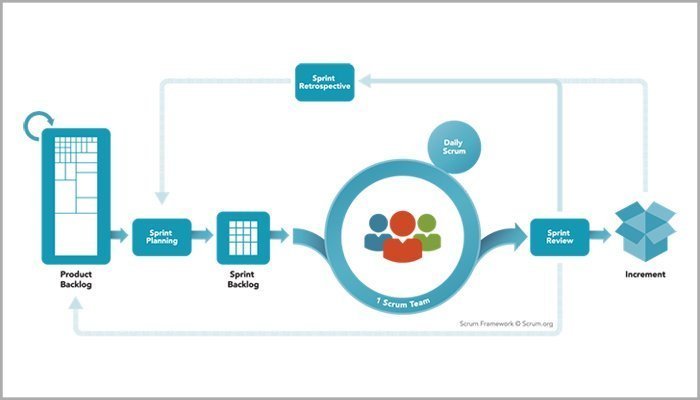
Scrum describes a set of ordered steps that are performed iteratively until product development is complete.
Framework, process or methodology?
Given this description of Scrum, which of the following three definitions fit best? Which one fits the least?
Framework
- A basic conceptional structure, as of ideas. (Merriam-Webster)
- A system of rules, ideas, or beliefs that is used to plan or decide something (Cambridge Dictionary)
- A set of ideas or facts that provide support for something (Britannica Dictionary)
Process
- A series of actions or steps taken in order to achieve a particular end. (Merriam-Webster)
- A series of actions or operations conducing to an end. (Cambridge Dictionary)
- A series of actions that produce something or that lead to a particular result (Britannica Dictionary)
Methodology
- A set of methods, rules, or ideas that are important in a science or art : a particular procedure or set of procedures (Merriam-Webster)
- A set of methods and principles used to perform a particular activity (Cambridge Dictionary)
- A system of methods and principles for doing something, for example for teaching or for carrying out research (Britannica Dictionary)
It seems clear to me that Scrum is best described as either a process or a methodology. Framework is the weakest fit of the three.
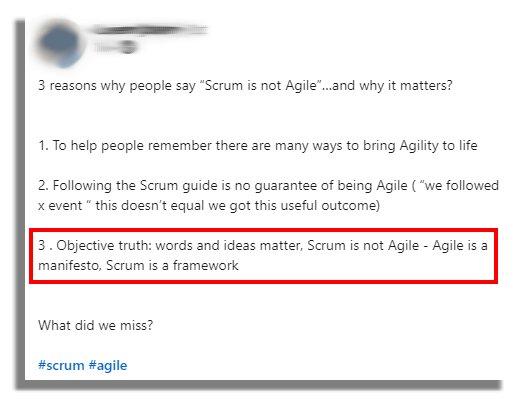
To many, the fact that Scrum is a framework is an objective truth that should not be questioned or debated.
The granularity fallacy
Those in the pro-framework camp will insist that since Scrum acts at a very high level, where users are encouraged to employ their own lower-level processes, techniques and methods, then Scrum can’t qualify as a process or a methodology. It has to be seen as a framework.
I call this the granularity fallacy.
Just because Scrum doesn’t specify who starts the Daily Scrum or provide teams a full-fledged Definition of Done doesn’t negate the fact that Scrum defines a process.
That’s like saying football is a framework because it doesn’t tell players whether they should run or throw on the first down. It’s a specious argument at best.
Mechanical Scrum
Scrum advocates will further argue that Scrum is a framework because it doesn’t work unless you build on top of it. If all you do is follow Scrum as it’s defined in the guide, you’ll fail.
The mechanical Scrum anti-pattern is a real thing.
It’s 100% true that to get the most out of Scrum you must complement it with various other strategies, processes and techniques. I don’t disagree with that. In fact, that’s exactly what I advocate.
The problem is, the ability to enhance, add to or build on top of a process or a methodology doesn’t preclude it from being a process or a methodology. However, the need to add to a philosophical framework does actually disqualify it from being that framework.
Physical vs philosophical frameworks
You see, you don’t add to or build on top of philosophical frameworks. Instead, you work within them.
- You work within a constitutional framework.
- You work within a judicial framework.
- You work within the Spring Boot framework.
For example, if Texas decided to add their own set of crazy amendments to the US Constitution, they could no longer be said to be working within the framework of the US Constitution.
For those who say Scrum is a framework because in order to get it to work you must add to it simply don’t understand the modern meaning of the word ‘framework.’
Scrum is immutable
Furthermore, in terms of the word’s colloquial use, Scrum disqualifies itself as a framework by requiring those who use it to use every single part of it. That’s not consistent with the modern usage of the word.
- You can settle a dispute within America’s judicial framework by only going to civil court. You don’t also have to go to family court and criminal court.
- The Supreme Court can settle a gun rights case within the constitutional framework by only referencing the 2nd amendment. They’re not required to reference the other 26.
- You can build an app with the Spring Boot framework that only uses REST APIs. You aren’t required to also use all of the other Spring Boot APIs.
In contrast, Scrum requires practitioners to use every single part of it.
Scrum insists that it is immutable, and if you leave any part out, what you are doing is not Scrum. That’s not consistent with how philosophical frameworks work.
Scrum’s immutability requirement brings it more in line with being a strict and rigid process than it does with being a lightweight and flexible framework.
Linguistic gymnastics
When presented with all of these arguments, members of the Scrum community will typically relent a bit and accept that the Scrum Guide may contain a process or it may describe a methodology, but that doesn’t mean it is a process or a methodology. Instead, the argument is made that:
- Scrum is not a process, but is instead a framework that contains a process.
- Scrum is not a methodology, but is instead a framework that contains a methodology
It all becomes exhausting linguistic gymnastics that is neither helpful nor productive. What’s more, it alienates people, as outsiders just see practitioners partaking in endless word games to convince the world that Scrum is something that it’s not.
The meaning behind the message
I do understand why the Scrum community demands that everyone call Scrum a framework and not a process or a methodology.
Scrum won’t work if all you do is blindly follow the Scrum guide.
- You have to add to it.
- You have to enhance it.
- You have to experiment with it.
- You have to build on top of it.
To emphasize this point, Scrum propagates the notion that it is a ‘framework’, despite the fact that the word ‘framework’ isn’t an accurate depiction of what the Scrum Guide describes. It’s a disingenuous wordplay, but I do understand why they do it.
When is it okay to lie?
The Scrum community describes Scrum as a framework for the same reason a parent tells their child a spoonful of broccoli will taste like ice cream. It’s an ‘end justifies the means’ mentality.
The wordplay has noble intent.
The wordplay is also a lie. Lying to people doesn’t sit well with me.
If a team decides to adopt Scrum, why begin the team building process by propagating a lie? And why put so much effort into forcing other people to believe and recant the lie?
That hardly seems like an effective leadership strategy to me. Why not just be honest and call Scrum what it really is?
What’s in a name?
Now does it even matter whether Scrum is a framework, process or a methodology?
It actually doesn’t matter as much to me as it may seem.
You can call Scrum a ‘pink and purple people eater’ for all I care, just so long as you implement Scrum according to the way it’s described in the Scrum Guide.
I love Scrum, and I strongly believe that it’s the best, all-around product development strategy around.
However, what I don’t like is the vitriol, bullying, mockery, hatred, cancel culture and calls for censorship that happen when someone refers to Scrum as a process or methodology.
It seems that to be accepted into the Scrum tribe, you must unlearn the proper definition of common words and relearn new definitions you know are wrong.
It’s a strange, Orwellian initiation where you must not only demonstrate that you believe that a lie is the truth, but you must aggressively mock and shun others who don’t repeat the doublespeak you’ve been taught.
The ugly side of dogmatism
If you don’t agree with the arguments I’ve made here, that’s fine.
However, I do think I have presented a well-thought out and well-articulated set of ideas as to why Scrum is best described as a methodology or a process and not a framework.
Disagreement is fine with me, but disagreement is clearly not tolerated by others.
When I first learned about Scrum, I remember posting somewhere how I thought it was an amazing methodology, only to be belittle by certified Scrum Masters, Agile coaches and trainers.
I shrugged it off, only to be flogged by the same ‘framework stick’ any subsequent time I dared to challenge what others described as ‘objective truth.’
Most recently on LinkedIn, certified Scrum Masters were blasting me as ‘fake news’ and demanding I stop harming the community by sharing my subversive thoughts on the topic. The Scrum community has a really ugly side.
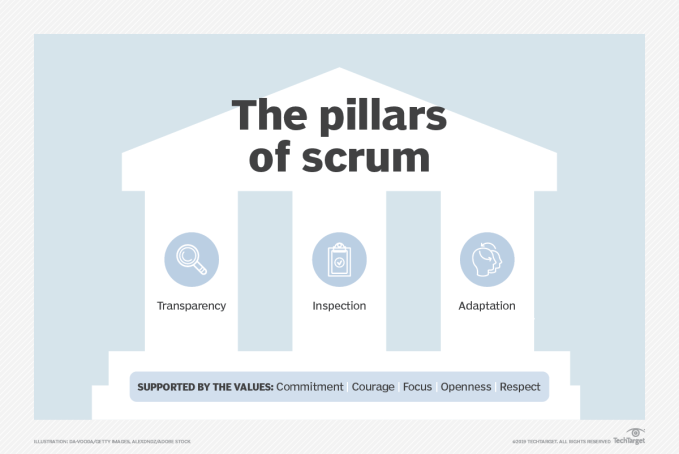
Courage, respect and openness are Scrum values that seem to disappear when you say Scrum is not a framework.
Embrace Scrum values
I honestly don’t care what you call Scrum.
What I do care about is the manner in which people treat each other.
Openness, courage and respect are all Scrum values.
For a community to thrive, it must be open, respectful and have the courage to accept criticism and entertain new ideas.
Otherwise, we build silos, alienate newcomers and present an unwelcoming face to the world, all of which does a disservice to highly-motivated teams that need an effective mechanism to help build products and generate value through adaptive solutions to complex problems.
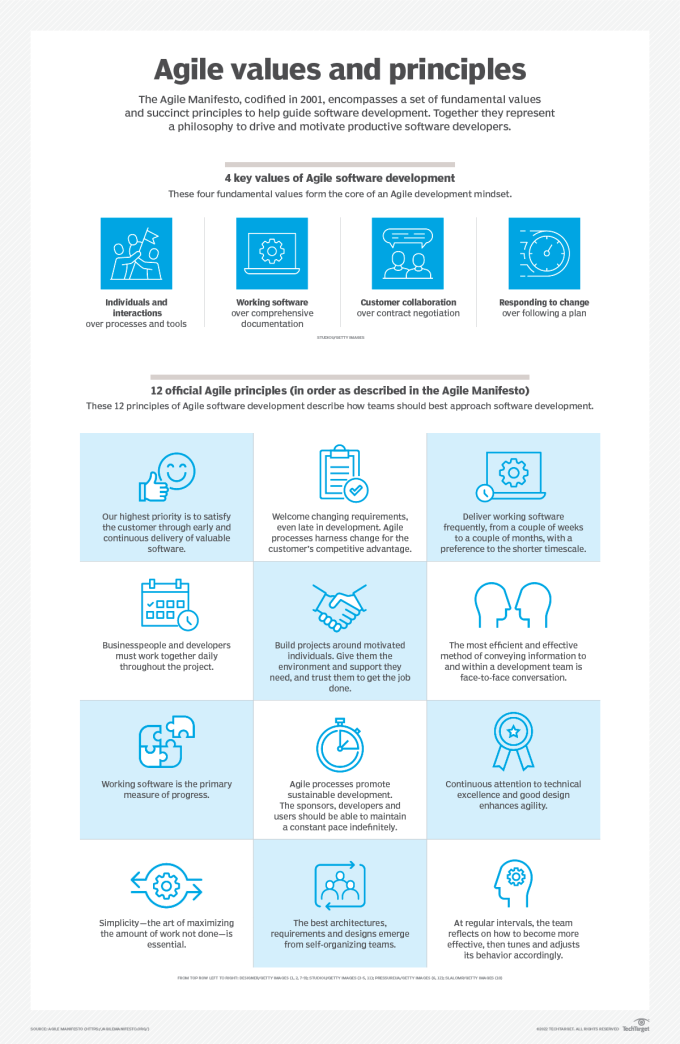
While the word Agile never appears in the Scrum Guide, Scrum is often referred to as an Agile framework or methodology.
Darcy DeClute is a Certified Cloud Practitioner and author of the Scrum Master Certification Guide. Popular both on Udemy and social media, Darcy’s @Scrumtuous account has well over 250K followers on Twitter/X.



